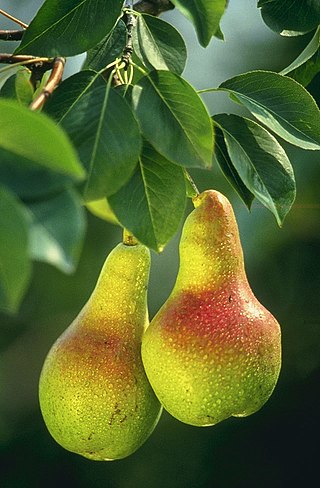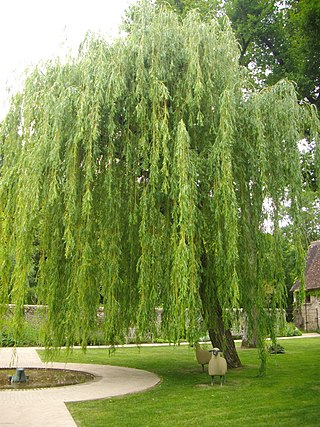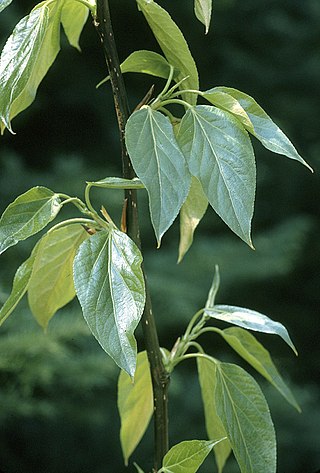
Kumquats, or cumquats in Australian English, are a group of small, angiosperm, fruit-bearing trees in the flowering plant family Rutaceae. Their taxonomy is disputed. They were previously classified as forming the now-historical genus Fortunella or placed within Citrus, sensu lato. Different classifications have alternatively assigned them to anywhere from a single species, C. japonica, to numerous species representing each cultivar. Recent genomic analysis would define three pure species, Citrus hindsii, C. margarita and C. crassifolia, with C. x japonica being a hybrid of the last two.

Pears are fruits produced and consumed around the world, growing on a tree and harvested in late summer into mid-autumn. The pear tree and shrub are a species of genus Pyrus, in the family Rosaceae, bearing the pomaceous fruit of the same name. Several species of pears are valued for their edible fruit and juices, while others are cultivated as trees.

In agriculture, monoculture is the practice of growing one crop species in a field at a time. Monoculture is widely used in intensive farming and in organic farming: both a 1,000-hectare cornfield and a 10-ha field of organic kale are monocultures. Monoculture of crops has allowed farmers to increase efficiency in planting, managing, and harvesting, mainly by facilitating the use of machinery in these operations, but monocultures can also increase the risk of diseases or pest outbreaks. Diversity can be added both in time, as with a crop rotation or sequence, or in space, with a polyculture or intercropping.

A plum is a fruit of some species in Prunus subg. Prunus. Dried plums are most often called prunes, though after the year 2000 in the United States they may be just labeled as 'dried plums'.

A plantation is an agricultural estate, generally centered on a plantation house, meant for farming that specializes in cash crops, usually mainly planted with a single crop, with perhaps ancillary areas for vegetables for eating and so on. The crops that are grown include cotton, cannabis, coffee, tea, cocoa, sugar cane, opium, sisal, oil seeds, oil palms, fruits, rubber trees and forest trees. Protectionist policies and natural comparative advantage have sometimes contributed to determining where plantations are located.

Taxodium is a genus of one to three species of extremely flood-tolerant conifers in the cypress family, Cupressaceae. The generic name is derived from the Latin word taxus, meaning "yew", and the Greek word εἶδος (eidos), meaning "similar to." Within the family, Taxodium is most closely related to Chinese swamp cypress and sugi.

Pinus contorta, with the common names lodgepole pine and shore pine, and also known as twisted pine, and contorta pine, is a common tree in western North America. It is common near the ocean shore and in dry montane forests to the subalpine, but is rare in lowland rain forests. Like all pines, it is an evergreen conifer.

Arbutus is a genus of 12 accepted species of flowering plants in the family Ericaceae, native to warm temperate regions of the Mediterranean, western Europe, the Canary Islands and North America known as madrones. The name Arbutus was taken from Latin, where it referred to Arbutus unedo.

Boa Esperança is a Brazilian municipality from the state of Minas Gerais. The municipality is located by the Serra da Boa Esperança, which became celebrated through song that brings its name, compounded by Lamartine Babo and performed by several singers. Across its territory passes Rio Grande, important to the development of the region. The economy of Boa Esperança is based on coffee plantations and tourism.

Cassia fistula, also known as golden shower, purging cassia, Indian laburnum, Kani Konna, or pudding-pipe tree, is a flowering plant in the family Fabaceae. The species is native to the Indian subcontinent and adjacent regions of Southeast Asia. It is the official state flower of Kerala state in India. It is also a popular ornamental plant and is also used in herbal medicine.

Taxodium distichum is a deciduous conifer in the family Cupressaceae. It is native to the southeastern United States. Hardy and tough, this tree adapts to a wide range of soil types, whether wet, salty, dry, or swampy. It is noted for the russet-red fall color of its lacy needles.

Salix babylonica is a species of willow native to dry areas of northern China, but cultivated for millennia elsewhere in Asia, being traded along the Silk Road to southwest Asia and Europe.

Stenandrium is a genus of flowering plants in the family Acanthaceae native to the Americas.

Vachellia nilotica, more commonly known as Acacia nilotica, and by the vernacular names of gum arabic tree, babul, thorn mimosa, Egyptian acacia or thorny acacia, is a flowering tree in the family Fabaceae. It is native to Africa, the Middle East and the Indian subcontinent. It is also considered a 'weed of national significance' and an invasive species of concern in Australia, as well as a noxious weed by the federal government of the United States.

Mallee are trees or shrubs, mainly certain species of eucalypts, which grow with multiple stems springing from an underground lignotuber, usually to a height of no more than 10 m (33 ft). The term is widely used for trees with this growth habit across southern Australia, in the states of Western Australia, South Australia, New South Wales and Victoria, and has given rise to other uses of the term, including the ecosystems where such trees predominate, specific geographic areas within some of the states and as part of various species' names.

Deroceras is a taxonomic genus of small to medium-sized air-breathing land slugs in the family Agriolimacidae.

Populus balsamifera, commonly called balsam poplar, bam, bamtree, eastern balsam-poplar, hackmatack, tacamahac poplar, tacamahaca, is a tree species in the balsam poplar species group in the poplar genus, Populus. The genus name Populus is from the Latin for poplar, and the specific epithet balsamifera from Latin for "balsam-bearing".

Christmas tree cultivation is an agricultural, forestry, and horticultural occupation which involves growing pine, spruce, and fir trees specifically for use as Christmas trees.

Mangifera indica, commonly known as mango, is a species of flowering plant in the family Anacardiaceae. It is a large fruit tree, capable of growing to a height of 30 metres. There are two distinct genetic populations in modern mangoes – the "Indian type" and the "Southeast Asian type".

Zanthoxylum riedelianum is a species of the plant in the genus Zanthoxylum in the family Rutaceae. The native range of this species is Mexico to South America.




















